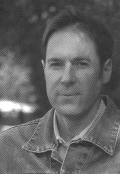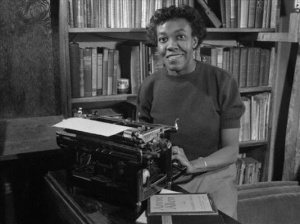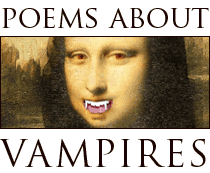
In honor of National Poetry Month we asked one of our favorite poets, Dobby Gibson, author of two volumes of poetry (Polar and Skirmish) to tell us about five poems or poets that have disturbed his universe. He spoke with us via email.
__________________________________________________
 Dobby Gibson: What are the five poets or poems that have “most disturbed” my universe? I’m so grateful for the way this question is worded — “most disturbed” rather than “most important,” or (gulp) “best.” Setting aside the haze of canonic formaldehyde or an academic’s chilly jeweler’s loupe, these five poets, poems and books of poems have all torn something open in me and altered or redirected my consciousness in ways that are rich enough to be worth repeating and, in this case, attempting to share.
Dobby Gibson: What are the five poets or poems that have “most disturbed” my universe? I’m so grateful for the way this question is worded — “most disturbed” rather than “most important,” or (gulp) “best.” Setting aside the haze of canonic formaldehyde or an academic’s chilly jeweler’s loupe, these five poets, poems and books of poems have all torn something open in me and altered or redirected my consciousness in ways that are rich enough to be worth repeating and, in this case, attempting to share.
The Selected Poems of Frank O’Hara, Frank O’Hara
 When I was 26, I had yet to attempt to write a poem and had never read a poet more contemporary than T.S. Eliot. I was taught poetry in school only as a way of understanding the past, understanding what people hundreds of years ago in England were thinking about while sitting around in colorful stockings and eating boiled venison. Which is to say, like most Americans, I was taught that poetry was antique.
When I was 26, I had yet to attempt to write a poem and had never read a poet more contemporary than T.S. Eliot. I was taught poetry in school only as a way of understanding the past, understanding what people hundreds of years ago in England were thinking about while sitting around in colorful stockings and eating boiled venison. Which is to say, like most Americans, I was taught that poetry was antique.
In 1996, when I was completing an M.F.A. degree in fiction in the middle of Indiana, someone handed me the Selected Poems of Frank O’Hara, a book that startled and mesmerized me in a way that none has since. (For one thing, the cover of this particular edition showed a Larry Rivers portrait of O’Hara, standing nude but for a pair of boots, his “flag” majestically raised to half mast.) Inside this book, I was stunned to discover, among other things, that poetry could be a spontaneous act, that its driving logic could be conversational and associational, and that a poem could take as its subject something as immediate as the very act of its own making. These poems captured a ferociously witty downtown world that I desperately wanted to participate in. It’s said of the Velvet Underground that anyone who has listened to one of their records has started a band. The same could be said of O’Hara and poets.
The Windhover, Gerard Manley Hopkins
 I first read this poem in high school, and it was the first poem to get stuck in my head. Hopkins is best known for inventing—or, at least, putting a name to—a form of semi-free verse he called “sprung rhythm,” which this poem employs to dramatic effect. Hopkins, who was a Jesuit priest in Victorian England, was as intoxicated (if not more so) with the sounds of this versifying as he was the subject of his poems, to the point of sometimes inventing words, using complicated compound adjectives or obscuring meaning beneath layers of alliteration. Is there a more immediately contagious poet?
I first read this poem in high school, and it was the first poem to get stuck in my head. Hopkins is best known for inventing—or, at least, putting a name to—a form of semi-free verse he called “sprung rhythm,” which this poem employs to dramatic effect. Hopkins, who was a Jesuit priest in Victorian England, was as intoxicated (if not more so) with the sounds of this versifying as he was the subject of his poems, to the point of sometimes inventing words, using complicated compound adjectives or obscuring meaning beneath layers of alliteration. Is there a more immediately contagious poet?
Actual Air, David Berman
 This is an incredible first book of poems that bears the strange and funny stamp of the poet’s teacher, James Tate, as well as the influence of neo-surrealists such as Russell Edson and Charles Simic, but is nonetheless entirely original in the particularities of its voice, punk humor and mad logic. With the exception of a complementary, if short, review in the New Yorker, Actual Air was largely ignored by American poetry’s power brokers despite having now sold more than 10,000 copies. This may be because Berman, better known for his band, The Silver Jews, exists outside of their academic-industrial system and has publicly expressed a healthy distrust of its claustrophobic forces. Or this may be because Berman appears to have quit writing poems, sadly, at least for the time being.
This is an incredible first book of poems that bears the strange and funny stamp of the poet’s teacher, James Tate, as well as the influence of neo-surrealists such as Russell Edson and Charles Simic, but is nonetheless entirely original in the particularities of its voice, punk humor and mad logic. With the exception of a complementary, if short, review in the New Yorker, Actual Air was largely ignored by American poetry’s power brokers despite having now sold more than 10,000 copies. This may be because Berman, better known for his band, The Silver Jews, exists outside of their academic-industrial system and has publicly expressed a healthy distrust of its claustrophobic forces. Or this may be because Berman appears to have quit writing poems, sadly, at least for the time being.
This book, which has inspired a litany of imitators, was rejected by dozens of small-press contests, now the primary means by which a beginning poet can get his or her book published in America. Reading this book with that knowledge, it’s a wonder how anything halfway decent ever gets published by the system.
Cold Pluto, Mary Ruefle
 Mary has a ferociously associative mind, and she uses it to push poems into really strange territory. She also uses humor to disarm the reader, often opening the way for intensely daring, bizarre and deeply truthful pronouncements. Her poems are wonderfully lyrical and feverishly imaginative. Part surrealist, part nutty preacher, Mary is the most poety-poet I know, and few poets have been a bigger influence on my own work. I’d throw myself in front of a train to save this book’s life, although this book seems to be throwing itself in front of a train to save my own
Mary has a ferociously associative mind, and she uses it to push poems into really strange territory. She also uses humor to disarm the reader, often opening the way for intensely daring, bizarre and deeply truthful pronouncements. Her poems are wonderfully lyrical and feverishly imaginative. Part surrealist, part nutty preacher, Mary is the most poety-poet I know, and few poets have been a bigger influence on my own work. I’d throw myself in front of a train to save this book’s life, although this book seems to be throwing itself in front of a train to save my own
In a White Light, Michael Burkard
 Burkard, a recovering alcoholic who often writes about the effects of the disease, writes resonant, semi-abstract poems that explore the conflicted interiors of the mind, poems that are written in the spirit of Denis Johnson. His poems read as damaged, late-night missives. The power of Burkard’s work, for me, has always lied in its wonderfully inventive syntax, and in the mysterious way his poems can come off as both haunted and joyful.
Burkard, a recovering alcoholic who often writes about the effects of the disease, writes resonant, semi-abstract poems that explore the conflicted interiors of the mind, poems that are written in the spirit of Denis Johnson. His poems read as damaged, late-night missives. The power of Burkard’s work, for me, has always lied in its wonderfully inventive syntax, and in the mysterious way his poems can come off as both haunted and joyful.
This particular book was published in 1977 by L’Epervier Press in a rudimentary paperback whose cover is an enormous black-and-white portrait of Burkard with a cigarette dangling from his lip. For years, until I was lucky enough to stumble upon an extremely rare copy in a used bookstore, I carried around this book in Xerox form, a bootleg copy made in the Indiana University Library. I’ve always been more interested in poetry’s private powers than its public obligations, and this is one of those books that I love, in part, because it feels like a privileged secret.





 In honor of Shark Week, the Discovery Channel’s annual weeklong series of television programs devoted to sharks,
In honor of Shark Week, the Discovery Channel’s annual weeklong series of television programs devoted to sharks, 
 Dobby Gibson:
Dobby Gibson:  When I was 26, I had yet to attempt to write a poem and had never read a poet more contemporary than T.S. Eliot. I was taught poetry in school only as a way of understanding the past, understanding what people hundreds of years ago in England were thinking about while sitting around in colorful stockings and eating boiled venison. Which is to say, like most Americans, I was taught that poetry was antique.
When I was 26, I had yet to attempt to write a poem and had never read a poet more contemporary than T.S. Eliot. I was taught poetry in school only as a way of understanding the past, understanding what people hundreds of years ago in England were thinking about while sitting around in colorful stockings and eating boiled venison. Which is to say, like most Americans, I was taught that poetry was antique. I first read this poem in high school, and it was the first poem to get stuck in my head. Hopkins is best known for inventing—or, at least, putting a name to—a form of semi-free verse he called “sprung rhythm,” which this poem employs to dramatic effect. Hopkins, who was a Jesuit priest in Victorian England, was as intoxicated (if not more so) with the sounds of this versifying as he was the subject of his poems, to the point of sometimes inventing words, using complicated compound adjectives or obscuring meaning beneath layers of alliteration. Is there a more immediately contagious poet?
I first read this poem in high school, and it was the first poem to get stuck in my head. Hopkins is best known for inventing—or, at least, putting a name to—a form of semi-free verse he called “sprung rhythm,” which this poem employs to dramatic effect. Hopkins, who was a Jesuit priest in Victorian England, was as intoxicated (if not more so) with the sounds of this versifying as he was the subject of his poems, to the point of sometimes inventing words, using complicated compound adjectives or obscuring meaning beneath layers of alliteration. Is there a more immediately contagious poet? This is an incredible first book of poems that bears the strange and funny stamp of the poet’s teacher, James Tate, as well as the influence of neo-surrealists such as Russell Edson and Charles Simic, but is nonetheless entirely original in the particularities of its voice, punk humor and mad logic. With the exception of a complementary, if short, review in the New Yorker, Actual Air was largely ignored by American poetry’s power brokers despite having now sold more than 10,000 copies. This may be because Berman, better known for his band, The Silver Jews, exists outside of their academic-industrial system and has publicly expressed a healthy distrust of its claustrophobic forces. Or this may be because Berman appears to have quit writing poems, sadly, at least for the time being.
This is an incredible first book of poems that bears the strange and funny stamp of the poet’s teacher, James Tate, as well as the influence of neo-surrealists such as Russell Edson and Charles Simic, but is nonetheless entirely original in the particularities of its voice, punk humor and mad logic. With the exception of a complementary, if short, review in the New Yorker, Actual Air was largely ignored by American poetry’s power brokers despite having now sold more than 10,000 copies. This may be because Berman, better known for his band, The Silver Jews, exists outside of their academic-industrial system and has publicly expressed a healthy distrust of its claustrophobic forces. Or this may be because Berman appears to have quit writing poems, sadly, at least for the time being. Mary has a ferociously associative mind, and she uses it to push poems into really strange territory. She also uses humor to disarm the reader, often opening the way for intensely daring, bizarre and deeply truthful pronouncements. Her poems are wonderfully lyrical and feverishly imaginative. Part surrealist, part nutty preacher, Mary is the most poety-poet I know, and few poets have been a bigger influence on my own work. I’d throw myself in front of a train to save this book’s life, although this book seems to be throwing itself in front of a train to save my own
Mary has a ferociously associative mind, and she uses it to push poems into really strange territory. She also uses humor to disarm the reader, often opening the way for intensely daring, bizarre and deeply truthful pronouncements. Her poems are wonderfully lyrical and feverishly imaginative. Part surrealist, part nutty preacher, Mary is the most poety-poet I know, and few poets have been a bigger influence on my own work. I’d throw myself in front of a train to save this book’s life, although this book seems to be throwing itself in front of a train to save my own Burkard, a recovering alcoholic who often writes about the effects of the disease, writes resonant, semi-abstract poems that explore the conflicted interiors of the mind, poems that are written in the spirit of Denis Johnson. His poems read as damaged, late-night missives. The power of Burkard’s work, for me, has always lied in its wonderfully inventive syntax, and in the mysterious way his poems can come off as both haunted and joyful.
Burkard, a recovering alcoholic who often writes about the effects of the disease, writes resonant, semi-abstract poems that explore the conflicted interiors of the mind, poems that are written in the spirit of Denis Johnson. His poems read as damaged, late-night missives. The power of Burkard’s work, for me, has always lied in its wonderfully inventive syntax, and in the mysterious way his poems can come off as both haunted and joyful.